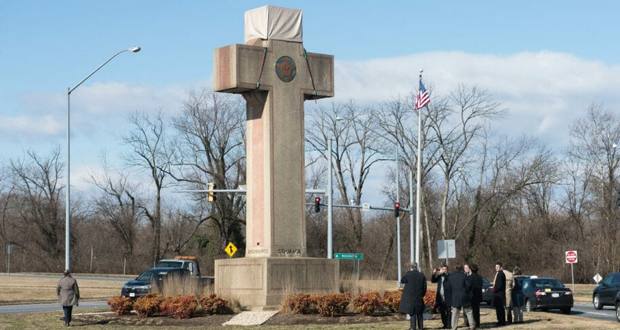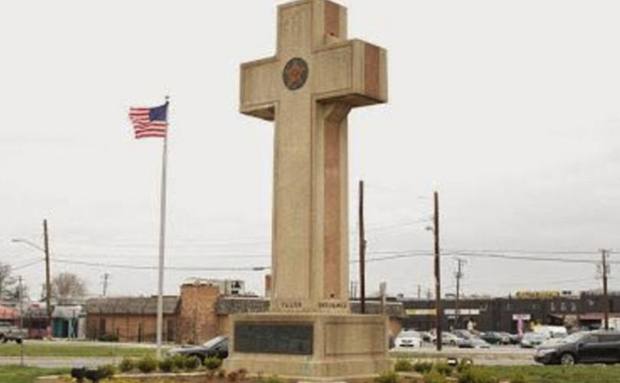Will the Supreme Court protect this 40-foot veteran’s cross?

The Supreme Court seemed poised Wednesday to protect a 40-foot memorial cross on public land in Bladensburg, Maryland, from a lawsuit that argues it violates the Constitution.
Though the bottom-line outcome was never seriously in doubt, the justices appeared divided and confused during Wednesday’s argument as to why the monument should pass constitutional muster.
The Court’s jurisprudence concerning religion in public life is famously confused — on one day in 2005, the high court said that a statue of the Ten Commandments near the Texas statehouse did not violate the Constitution, but that a similar display in a Kentucky courthouse did. Justice Neil Gorsuch colorfully derided the controlling precedents as “a dog’s breakfast” during Wednesday’s arguments.
Two parties are separately defending the memorial, known colloquially as the Peace Cross; The American Legion, which built and dedicated the memorial to the World War One dead of Prince George’s County in 1925, and the Maryland state parks commission that administers the site today. The Legion urged the Court to sanction government-backed sectarian displays provided they do not proselytize or coerce onlookers into religious practice.
Gorsuch said he did not see how that solution was meaningfully different from the current case law, which requires courts to ask whether a display endorses religion, in appearance or in reality.
“It seems to me that you are taking us right back to the dog’s breakfast you’ve warned us about,” Gorsuch said.
Chief Justice John Roberts sounded similar themes, but acknowledged that each religious display case is unique, making general rules and clear tests difficult in this area of law.
“What you advertise is a pretty concise test, but it degenerates pretty quickly,” the chief said, elsewhere suggesting the current test might be the best judges can do.
The parks commission argued on more narrow grounds, saying that the Peace Cross does not suggest explicitly Christian concepts. Rather, it recalls European battle cemeteries, where crosses were typically used as headstones. What’s more, the Peace Cross has other features that dilute its religious content, such as the seal of the Legion.
Justice Elena Kagan — who defended a cross memorial as solicitor general in the Obama administration — seemed to agree with that proposition, noting the cross stood without objection for over 90 years.
“There are other war memorials [nearby],” Kagan said. “There are no religious words on the memorial. Quite the opposite — all the words on the memorial are words about military valor and so forth. So why in a case like that can we not say, essentially, that the religious content has been stripped off this monument?”
Some justices are skeptical
But Justice Ruth Bader Ginsburg seemed skeptical.
“Does the cross really have a dual meaning?” Ginsburg asked. “It is the preeminent symbol of Christianity.”
Justice Stephen Breyer proposed a middle way, suggesting that older memorials invoking sectarian themes should be protected, though similar monuments should not be erected in the future.
“History counts,” Breyer said. “But no more. We are a different country now, and there are more than 50 different religions.”
A divided three-judge panel of the 4th U.S. Circuit Court of Appeals found that the memorial violates the Constitution, over a dissent that feared the ruling would prompt the removal of crosses from Arlington National Cemetery, which sits in the 4th Circuit’s jurisdiction.
The case arose in 2014, when three Maryland residents sued the parks commission with the support of the American Humanist Association (AHA). The plaintiffs say that the Peace Cross violates the First Amendment’s ban on religious favoritism.
The Legion intervened in the case given its historical connection to the monument. The Legion and other veterans groups still host annual programs at the Peace Cross.
Speaking outside the Supreme Court after Wednesday’s argument, the Legion’s national judge advocate expressed regret that the justices needed to hear the case at all.
“This memorial honors and remembers those 49 heroes that died for our freedom,” Bartlett said. “We feel terrible that we have to be here. When we signed up to go into the service nobody asked what our religion was. We went in and did our job just like those men.”
“Let’s keep honoring them just like we need to honor all of our memorials,” he added.
The Supreme Court is expected to issue its ruling in The American Legion v. American Humanist Association by the end of June.

– westernjournal.com and dailycallernewsfoundation.org






